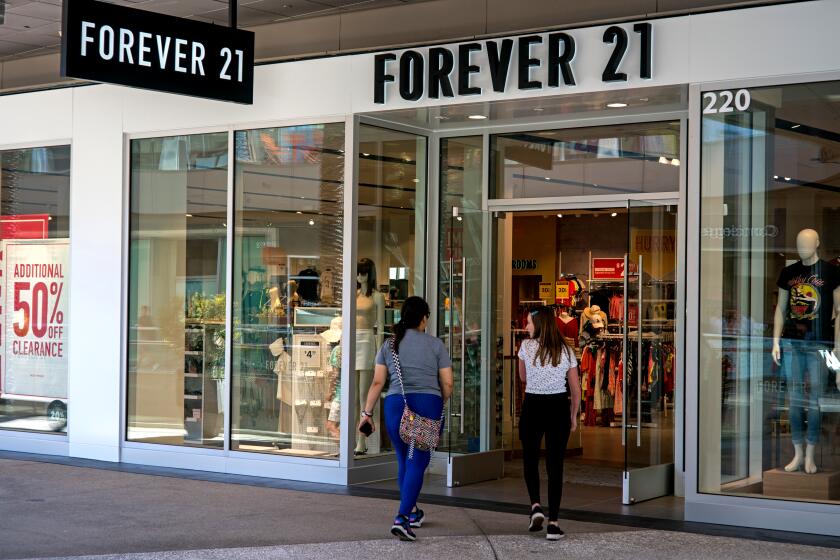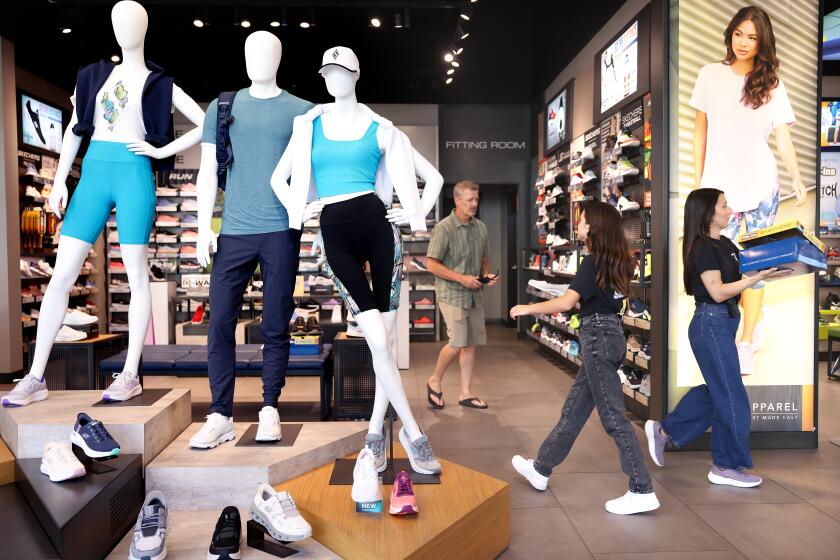From Bratz dolls to Krusty the Clown: How Trump tariffs are hurting L.A. toy makers

- Share via
- The founder of MGA Entertainment, maker of Bratz dolls and other toys, says his Chatsworth company will be devastated by tariffs imposed on China, where more than half of its products are made.
- MGA Entertainment is among several high-profile L.A.-based toy makers and retailers caught in the crossfire of Trump’s global trade war.
Isaac Larian thought Donald Trump was good for business in his first term when he lowered taxes. So the billionaire entrepreneur figured “common sense” would prevail in his second term, despite the president’s campaign to impose tariffs as a way of resuscitating American manufacturing.
It hasn’t worked out that way, stunning the founder and chief executive of MGA Entertainment, the Chatsworth company that makes its popular Bratz and L.O.L. Surprise dolls and other toys mostly in Asia.
A little more than half of MGA’s products are made in China, which on Tuesday vowed to take countermeasures against the United States after Trump threatened an additional 50% tariff on Chinese imports.
“Look, I’m not against Trump,” he said. “I think he really genuinely cares for the U.S.A., but it’s wrong to put these tariffs on toys. A lot of toys cannot be made here. What’s going to happen is the following: Let’s say a toy that was sold for $10 now will be $20, right? That means that a lot less people can afford it, which means layoffs, which means a small toy company is going out of business, right here in U.S.A.”

MGA Entertainment is among several high-profile L.A.-based toy makers and retailers caught in the crossfire of Trump’s global trade war.
Since Trump’s April 2 tariffs announcement, shares in El Segundo-based Mattel have plunged 26% to close at $14.49 on Tuesday; shares in Santa Monica’s Jakks Pacific, a maker of licensed toys such as Sonic the Hedgehog, dropped 25% to $18.51.
Other Los Angeles retailers whose products are primarily made in Asia or elsewhere overseas also have been hit in the stock sell-off. A legion of public and private apparel makers, including Guess and fast fashion standout Fashion Nova, rely on low-cost clothing manufactured across Asia.
“This is going to impact retailers small and large,” said Jonathan Gold, vice president of supply chain and customs policy for the National Retail Federation. “The majority of retailers sell products that are imported. If not, they’re selling products that are made here in the United States, but some of those might have imported components, and that’s going to raise costs as well.”
The Trump administration’s tariffs will significantly hurt Silicon Valley tech companies like Apple, which has manufacturing operations in China, Vietnam and India.
Larian, 71, who has built up a multibillion-dollar toy empire since emigrating from Iran as a teenager, knows all about toy manufacturing overseas — and in the United States.
His company, which employs 1,700, operates a factory in Hudson, Ohio, that makes some of its Little Tikes line of toddler outdoor playsets, drivable trucks and other toys, accounting for about a fifth of sales.
But more than half of MGA’s products are made in China, with the rest in Vietnam, Indonesia, India and elsewhere.
When MGA bought the toy line and its Ohio factory in 2006 from Newell Rubbermaid, Larian said, the business was virtually bankrupt, but he’s been able to keep the factory operating with upgrades and new products despite higher costs than in Asia.
“First of all, it’s been there for 60 years, and I never wanted to close the factory in the U.S.A.,” Larian said. “Secondly, they have certain expertise. We have employees that have been there for 50 years. Their children and grandchildren are there.”
Dolls are another story.
Larian said the industry has imported dolls for 100 years and making them is “very tedious work that is labor intensive” and simply not done domestically. And even if he could “wave a magic wand” and build a new factory in the United States, robots would have to do 90% of the work. “So how is that going to help the U.S.A.?” he asked.
Key drivers of Los Angeles’ economy — trade and logistics — will be hard hit by the tariffs announced by the Trump administration, economists say.
The country’s largest toymaker, Mattel, has been boosted by its Hollywood ambitions in recent years, but its biggest theatrical hit, “Barbie,” was based on its iconic line of dolls. Other popular toys include Hot Wheels, its Fisher-Price toddler line and its pricey line of American Girl dolls.
Mattel declined to comment ahead of its first-quarter earnings announcement. But at an investor conference last month, Chief Financial Officer Anthony DiSilvestro said that Mattel is less exposed to tariffs imposed on imports from China than other toy makers. He said Mattel has less than 40% of its production there, compared with an industry average of about 80%.
Chinese bloggers report Xi Jinping’s government is considering a ban on Hollywood movies. That would drag entertainment companies to the front lines of the trade war.
“What we’ve been doing over the last several years is diversifying our manufacturing footprint, optimizing our supply chain,” he said, adding that only about half of the company’s toy sales are in the U.S., which also lessens the effects of any U.S. tariffs.
Still, Mattel sources products from Indonesia and Malaysia, countries that have been hit with 32% and 24% tariffs, respectively. Another source is Mexico, which is seeking to negotiate with Trump over the tariffs.
Jakks Pacific is a small toy maker with significant exposure to whatever final tariffs are applied to imports from China, where the majority of its raw materials are sourced and its products manufactured, according to a regulatory filing. Trump on Tuesday announced he was proceeding with tariffs totaling 104% on Chinese goods.
The company sells generally inexpensive licensed toys at large retailers such as Walmart, with its Simpsons product line a top seller. It includes toys as cheap as a $4.99 Grandpa Simpson and as expensive as a $39.99 talking Krusty the Clown.
Tom Forte, an analyst at Maxim Group, said Jakks has a low-risk business model with its licensed toys based on popular entertainment figures and margins large enough to absorb some of the tariffs. However, he said it will still have to raise prices. “Working in its favor is that the majority of the products they sell are lower-priced,” he said.
The Los Angeles-based fast fashion retail chain Forever 21 filed for bankruptcy Sunday for the second time in six years after struggling to keep up with competitors.
Another large category of Los Angeles retailers affected by the tariffs are apparel makers that source raw materials and finished products from Asia. The industry already has been buffeted by foreign competition. Forever 21, an early leader in fast fashion, couldn’t compete with the likes of Zara, H&M and Shein and filed for bankruptcy for a second time last month.
The prominent L.A.-based fashion retailer Guess also has been squeezed, with its share price dropping 24% to $8.66 in the last week.
Founded in 1981 by the Marciano brothers, Guess makes jeans, accessories and other apparel sourced from more than 20 countries, with one-third of its products coming out of China, according to a regulatory filing.
More than half of its $3 billion in annual sales are outside of the U.S., said Eric Beder, chief executive and senior research analyst at Small Cap Consumer Research.
“Guess has diversified themselves significantly outside the U.S. in terms of where they sell their product. This is their own stores internationally and selling in major department stores globally,” said Beder, who believes shares are oversold and has a buy rating on the stock with a $23 price target.
The company did not respond to requests for comment.
Skechers is among the best-known retailers based in the Los Angeles area, with its popular comfort and slip-on footwear. It also sells athletic shoes and partners with celebrities such as Snoop Dogg.
Manhattan Beach-based Skechers announced record sales in the first quarter of 2024, while other brands like Nike see weak earnings. Here’s why.
Last month, the company announced record 2024 sales of nearly $9 billion and net earnings of about $640 million.
However, like other footwear makers, it sources most of its products from overseas.
Investment bank Stifel estimates the company sources 40% of its products from China and another 40% from Vietnam, both of which are subject to large tariffs.
It projects Sketchers could take a 68% earnings hit unless it raises prices or takes other measures to lessen the impact, such as relocating factories — but that wouldn’t be in the U.S., where there is an insufficient labor supply.
“Kids in the U.S. want to wear NIKE’S, not make them (thanks Dave Chappelle),” it said in the report, referencing a viral bit by the popular comedian.
The company did not respond to requests for comment, reflecting the reluctance of many businesses to speak out about the tariffs.
Rachel Michelin, president of the California Retailers Assn., said U.S. retailers were shocked by Trump’s tariffs after taking steps to diversify their sourcing and operations out of China to other locations overseas.
“I think we all support good-paying jobs here in the U.S. The challenge is that you can’t just turn on a dime and suddenly bring manufacturing back to the U.S., especially, I would say, for the retail industry,” she said.
The tariffs also came suddenly and at a critical time, when retailers are making decisions about what to order for the fall and holiday shopping season, something that is done months in advance. She said that many are in a “wait-and-see mode” to determine how it all shakes out, but some could face closure.
“Some of our smaller brands and our smaller retailers really have to make some decisions about whether they can still be competitive if these tariffs continue on indefinitely,” she said.
More to Read
Inside the business of entertainment
The Wide Shot brings you news, analysis and insights on everything from streaming wars to production — and what it all means for the future.
You may occasionally receive promotional content from the Los Angeles Times.
















